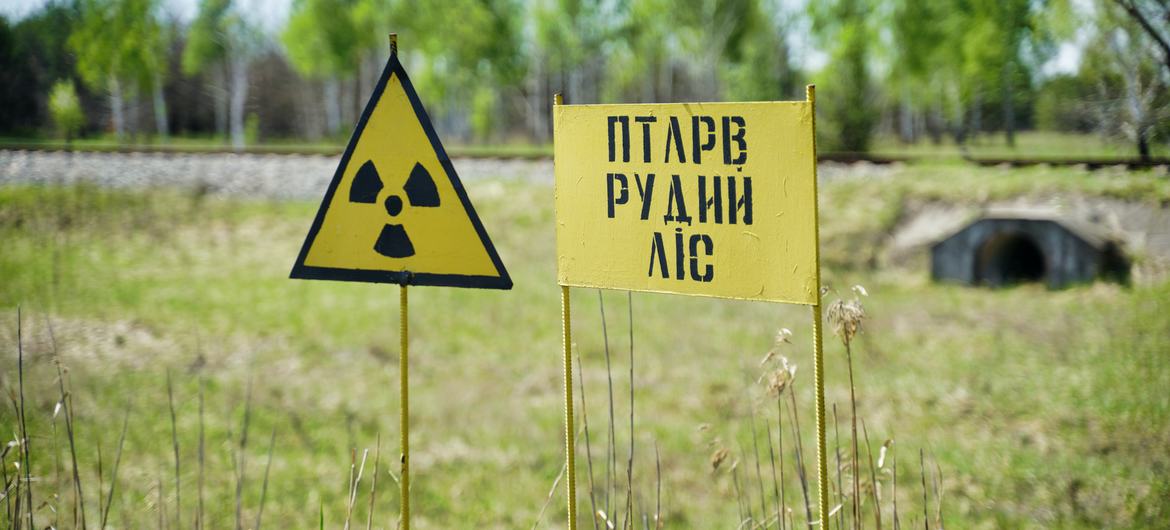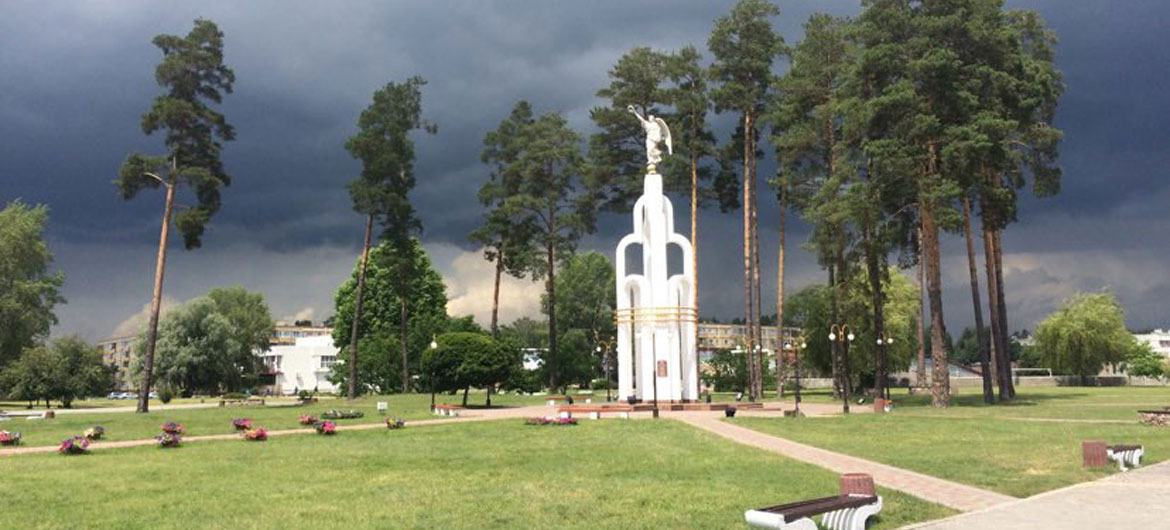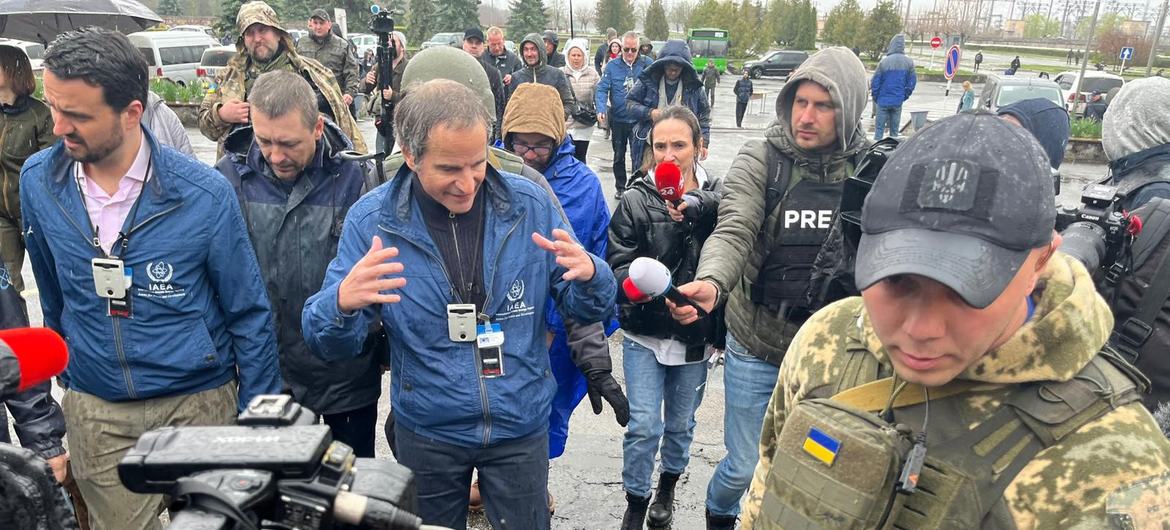The defunct Chernobyl nuclear plant, and the city of Slavutich – whose residents maintain the site, which needs constant monitoring to ensure radioactive material does not leak out – was occupied by Russian troops for over a month.
Bogdan Serdyuk, chairman of the union that represents plant workers, recalls the battle near the site, which marked the beginning of the Russian invasion, on 24 February.
“The station staff heard the roar of military equipment, and soon the site was surrounded by Russian tanks. The tracks threw up contaminated dust, which immediately increased the background radiation.
“The station has security units, specialized in counter-terrorist warfare, but they were no match for the Russian forces and, in any case, there are rules that prohibit combat operations on the territory of a nuclear power plant.”
The main problem, according to the staff, was that as a result of the shelling, power lines were damaged and both Slavutych and the plant itself, lost power.
“The plant has four units, including the one that was destroyed in the 1986 accident. All the nuclear fuel from the three units that were still functioning after the explosion was removed and placed in a nuclear waste repository”, explains Mr. Serdyuk.
“The fuel rods are stored in water that is circulated to keep them cool. The moment the power went off, everyone was worried about whether the water would begin to heat up. Experts believe that, if it is not circulated, the water could boil, and the spent fuel would begin to melt, with unpredictable consequences”.
Another cause for concern was the safety of the protective sarcophagus which contains the destroyed reactor of the fourth power unit, and the remains of nuclear waste. Damage to the sarcophagus could lead to radioactive dust escaping.
A concern for the whole world
Work at Chernobyl is carried out by some 2,700 people. Most live in Slavutych, a satellite city built immediately after the 1986 accident, around 50 kilometers away from the epicenter of the disaster.
Nuclear power plant workers with their families, as well as residents of the evacuated city of Pripyat, and the entire 30-kilometre zone around the station affected by radioactive contamination, were relocated there.
In peacetime, the plant employees in Slavutych commuted to work by train, which took about 45 minutes. However, when the railway lines were blown up, travel from Slavutych took eight hours, and staff now rotate, spending week-long shifts at the plant, which was not designed for people living on-site.
“Nuclear plants are designed to withstand an impact comparable in strength to an aircraft. But this is not the same as the shelling that took place at the Zaporizhzhya nuclear power plant”, warns Mr. Slavutych, in reference to another, still functioning, Ukrainian plant.
“The seizure of the Chernobyl nuclear power plant, and the shelling of the Zaporizhzhya nuclear power plant raise the question of nuclear safety not only for Ukraine. Nuclear power plants should not become targets for the military, because even partial destruction can lead to catastrophic consequences for the whole world”.
‘We cannot allow such a tragedy to happen again’
“We have a tradition in Slavutych. Every year, from April 25 to 26, at the same minutes when the Chernobyl accident occurred, we gather near for the Chernobyl victims”, says Vladimir Udovichenko, the town’s mayor.
“We silently honour the memory of those who protected Ukraine and the whole world from further terrible consequences of the accident. And today we will not break this tradition. We cannot allow such a tragedy to happen again.
“What happened at Chernobyl [following the Russian invasion] and continues now in Enerhodar [the town where the Zaporizhzhya plant is located] is unacceptable. This needs to be stopped and we now need to think about what can be done to strengthen the safety of nuclear power plants. We expect IAEA experts to work with us”.
IAEA team arrives in Ukraine
A team of IAEA staff, led by Director General Rafael Mariano Grossi, is visiting Chernobyl, to deliver equipment and conduct radiological and other assessments at the facility. Personal protective equipment will also be delivered.
In addition, IAEA specialists will repair the remote data control systems installed at the facility, which the occupying forcers disabled, resulting in IAEA staff at the Agency’s headquarters in Vienna being unable to receive online data from Chernobyl.
Since the beginning of the war, the IAEA has expressed serious concern about the safety and security of Ukraine’s nuclear facilities. According to Mr. Grossi, the physical integrity of nuclear power plants, the ability of personnel to work without excessive pressure, and access to external power sources should be ensured.
These rules have been seriously violated over the past two months. In March, communication with the Chernobyl nuclear power plant was lost. The station was left without external power supply, and for several days it was necessary to use emergency diesel generators.
“The IAEA’s presence in Chernobyl will be of paramount importance to our support activities for Ukraine, as it seeks to restore regulatory control over the nuclear power plant and ensure its safe and secure operation”, said Mr. Grossi. “This will be followed by additional IAEA missions to this, and other nuclear facilities in Ukraine”.












